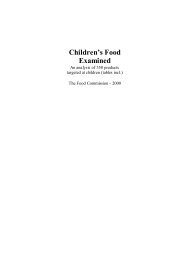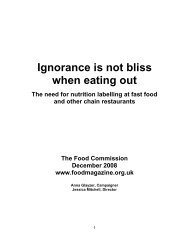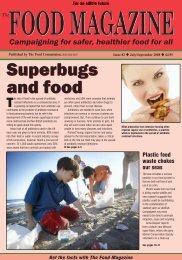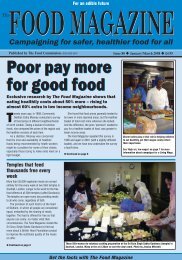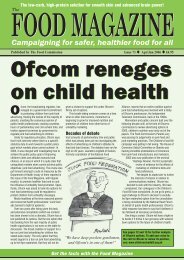Children's Nutrition Action Plan - The Food Commission
Children's Nutrition Action Plan - The Food Commission
Children's Nutrition Action Plan - The Food Commission
You also want an ePaper? Increase the reach of your titles
YUMPU automatically turns print PDFs into web optimized ePapers that Google loves.
Imogen Sharp<br />
Department of Health<br />
Current Department of Health nutrition initiatives include:<br />
• Review of the welfare foods programme;<br />
• Increase support for breastfeeding with a particular focus on low-income groups;<br />
• National School Fruit Scheme – which has already provided free fruit on a regular basis<br />
to 80,000 children;<br />
• Five-a-day programme to increase consumption through local initiatives;<br />
• Work with industry to improve fruit and vegetable promotion and improve the overall<br />
balance of diet including reductions in salt, fat and sugar;<br />
• Local action to tackle obesity and physical inactivity.<br />
Overview of existing Government policies on children and food in schools<br />
(1) Breakfast clubs<br />
During 1999 – 2001 the Department of Health funded a number of pilot breakfast clubs. Each<br />
of the 8 NHS Regions received £100,000 per year to provide start up and running costs for<br />
breakfast clubs in their regions. <strong>The</strong> number of clubs varied per region but throughout<br />
England over 230 clubs received funding from the project. Most of the schools involved were<br />
in deprived areas.<br />
Evaluation of the pilots is being carried out by the University of East Anglia. <strong>The</strong> interim<br />
report (May 2000) reported on some initial benefits of breakfast provision in schools, which<br />
included:<br />
• Improved concentration in morning classes;<br />
• Speedier integration of pupils into the school day;<br />
• Benefits for individual children who may have behavioural problems or need to care and<br />
feed themselves or other siblings;<br />
• Improved social skills;<br />
• Improved interaction across year groups;<br />
• Improved social contact between staff and pupils leading to better relationship.<br />
(2) School Lunches<br />
<strong>The</strong> Government considers it important that children should be able to have a healthy school<br />
meal. <strong>The</strong> DfES introduced minimum nutritional standards for school lunches – the first for<br />
over twenty years – with effect from 1 April 2001. A new duty to provide paid meals will<br />
ensure that LEAs and/or schools will continue, or in some cases restart, the provision of<br />
school lunches. LEAs or schools with delegated budgets for the provision of school meals are<br />
responsible for ensuring that the standards are met. LEAs are free to specify their own<br />
standards so long as they exceed the national standards.<br />
<strong>The</strong> nutritional standards are expressed in terms of the five food groups (as in the 'Balance of<br />
Good Health'). <strong>The</strong>y specify the types and frequency of food that should be available at the<br />
school lunch. <strong>The</strong> majority of respondents to the consultation favoured food based nutritional<br />
standards rather than nutrient based standards. Nutrient-based standards would not be<br />
<strong>The</strong> Children’s <strong>Nutrition</strong> <strong>Action</strong> <strong>Plan</strong>, published by <strong>The</strong> <strong>Food</strong> <strong>Commission</strong><br />
41



